Does Cheese Make Arthritis Worse in Older Adults
Arthritis, also known as joint inflammation, is inflammation of one or more joints in your body. The term "arthritis" itself isn't actually a single disease, but refers to 100+ types of arthritis and related conditions. Symptoms throughout the body include pain, swelling, stiffness, and reduced range of motion that makes performing certain tasks difficult, and these symptoms can intensify with age.
If you suspect you suffer from arthritis, it's always best to meet with a healthcare professional to determine the best path of action for you. But in addition to medications, physical therapy, and potentially joint surgery, lifestyle changes can make a big impact on how severely you experience arthritis symptoms.
"With arthritis, we want to keep inflammation at bay. The less inflamed the joints, the less pain you will be in," says Daily Harvest's nutritionist Amy Shapiro, MS, RD, CDN. So how should you go about reducing inflammation? As a first step, avoid the foods that science links to chronic inflammation from your diet ASAP. An excellent starting point: "[Limiting] fried foods and refined sugar while increasing less-processed whole foods can alleviate some symptoms of arthritis, like pain and swelling," notes Chelsey Amer, MS, RDN, owner of Chelsey Amer Nutrition, adding that doing so can also help you maintain a healthy weight.
Read on for 20 of the worst foods that can make arthritis worse so you know what to skip.

A particularly nefarious option for those with rheumatoid arthritis, an autoimmune disease, is high-sodium foods. "When you have rheumatoid arthritis, you may want to limit the amount of sodium that you eat. This is because corticosteroids that are often used to treat this type of arthritis can cause you to hold onto more salt," says Amy Gorin, MS, RDN, owner of Amy Gorin Nutrition in the New York City area. "And regularly taking in large amounts of sodium can increase inflammation in your body. If you have rheumatoid arthritis, you may want to consider limiting your daily sodium intake to 1,500 milligrams."
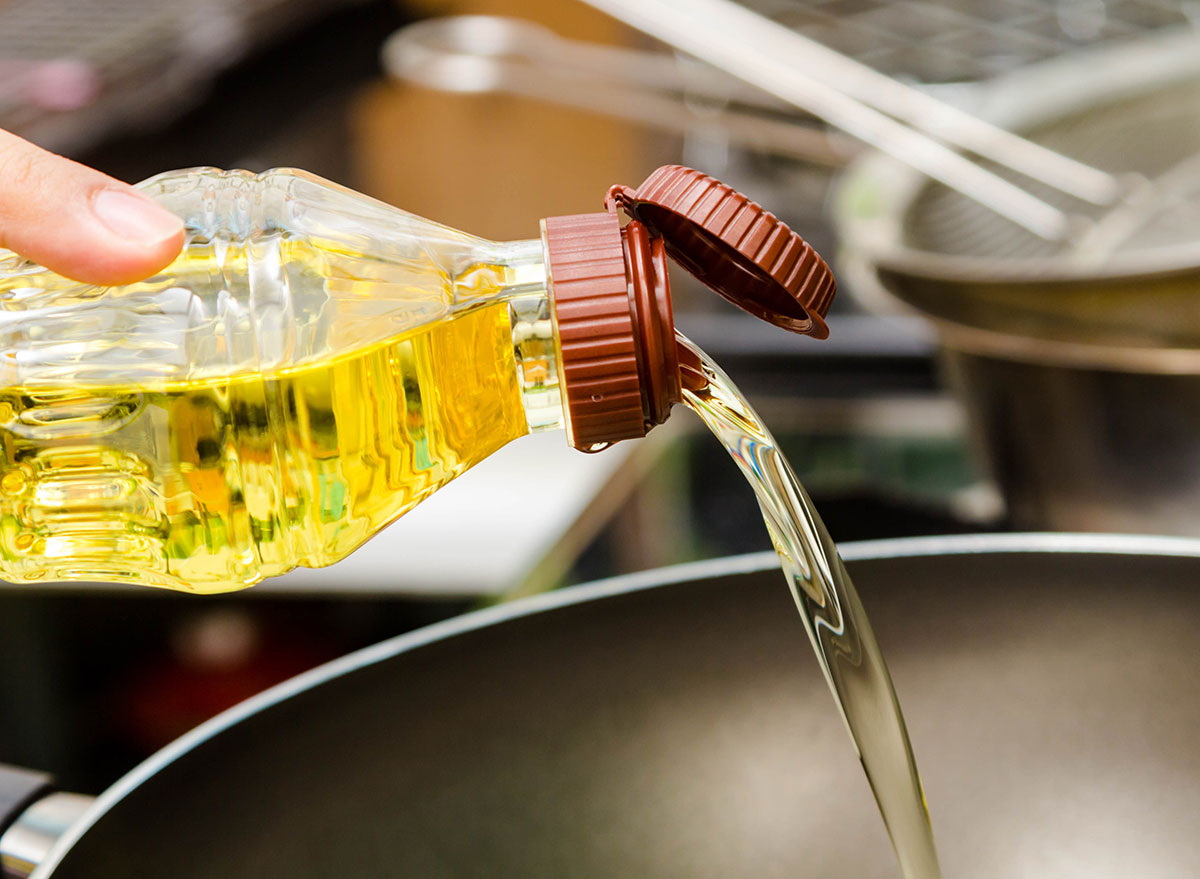
Do you cook with corn, soybean, canola, safflower, and sunflower oils? "These oils are commonly used in restaurants and at home and are high in omega-6 fatty acids, but very low in omega 3s," Shapiro says. "This imbalance can lead to inflammation, and since most individuals do not get enough omega-3s (from sources such as salmon, flax, walnuts, and chia) to balance out these oils, arthritic symptoms can worsen."

A tall, refreshing glass of soda? You best not, folks. For example, a 12-ounce can of Sunkist Orange soda packs in 44 grams of sugar (10 teaspoons worth) and far exceeds the maximum daily allotment of added sugar that men (nine teaspoons) and women (six teaspoons) should get daily, share Lyssie Lakatos, RDN, CDN, CFT & Tammy Lakatos Shames, RDN, CDN, CFT, The Nutrition Twins, authors of The Nutrition Twins' Veggie Cure and founders of the 21-Day Body Reboot. "Although sugar can be harmful for many reasons, it creates inflammation in the body, and sugar-sweetened soda, in particular, has been found to increase arthritis symptoms in women." And, "a large study found that just one sugary soda a day increased the risk for rheumatoid arthritis by 63 percent. This was compared to people who never drank soda and those who had it less than once a month," says Maggie Moon, MS, RD, author of The MIND Diet.
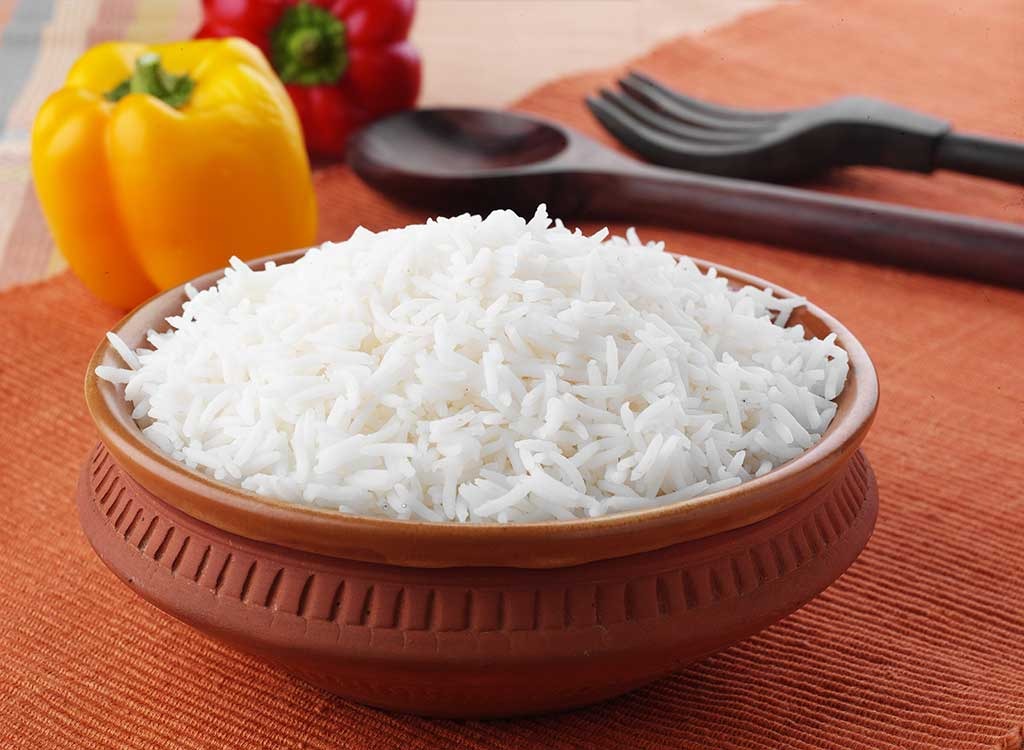
"White rice is a refined carbohydrate that may cause a spike in our blood sugar and can increase inflammation markers in our body, worsening the side effects of arthritis," comments Keri Gans, MS, RDN. Instead of this nutrient-lacking carb, load up on whole grains like farro, kamut, spelt berries, and brown rice.

Steer clear of this delightfully salty and addictive snack. "There are many studies linking a sub-optimal microbiome to inflammatory arthritis. Refined grain foods such as pretzels are exactly what a healthy microbiome doesn't crave," notes Moon. "Your microbiome would be much happier feeding off of whole fiber-rich foods like chickpeas, pistachios, or quinoa."

Cinnamon roll aficionados, perk up your ears. "Watch out for any packaged baked goods with partially hydrogenated oil as an ingredient. This ingredient contains trans fats, which you want to avoid always," says Gorin. "Trans fats are linked with inflammation in the body—and regularly consuming these fats increases your 'bad' LDL cholesterol, lowers your 'good' HDL cholesterol, and increases your risk of heart disease."
RELATED: Your guide to the anti-inflammatory diet that heals your gut, slows the signs of aging, and helps you lose weight.
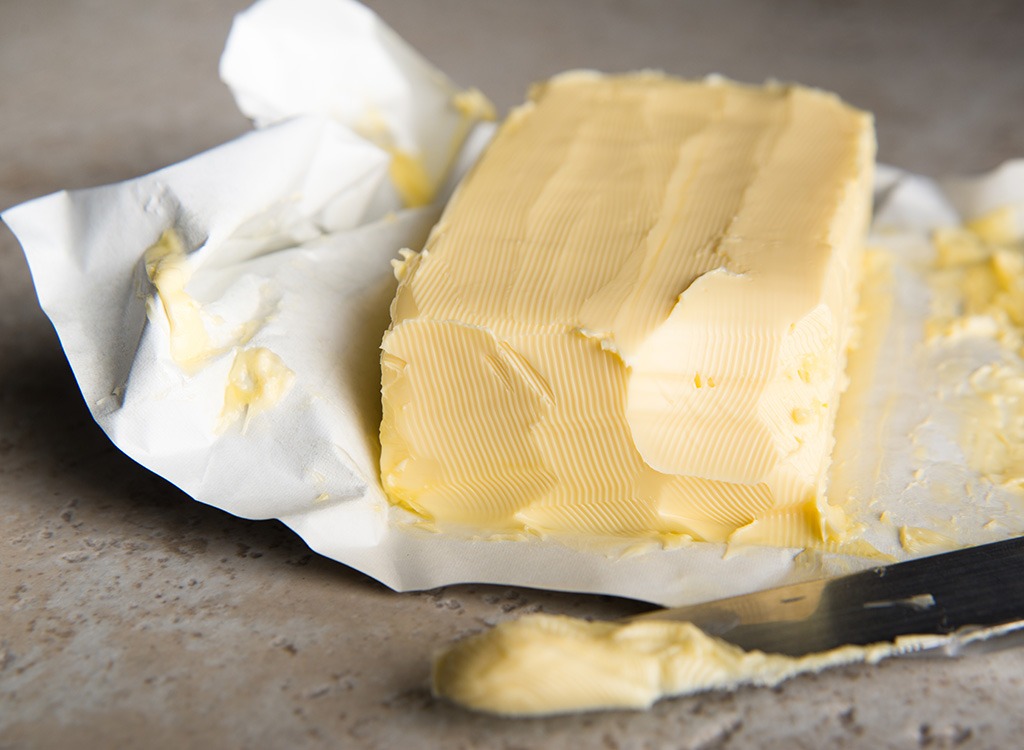
In case you didn't get the memo that this once-omnipresent butter substitute is a no-go, consider this: "Most margarines are made from trans fats. Trans fats have been linked to inflammation, heart disease, and cancer," says Meg Marie O'Rourke, RD-LDN. "Vegetable oils such as corn oil are put through a process called hydrogenation, changing the chemical formation from a Cis to a Trans. Trans fats are found in many [sweets such as cakes, cookies, and pie crust] and increase biomarkers of inflammation."

"Sausage is a processed meat, and all processed meats are high in AGEs (advanced glycation end products) that trigger inflammation in the body and worsen arthritis symptoms," note The Nutrition Twins. "While all meats contain AGEs, processed ones contain more." If you must indulge, consider our list of the best hot dogs and sausages for weight loss.
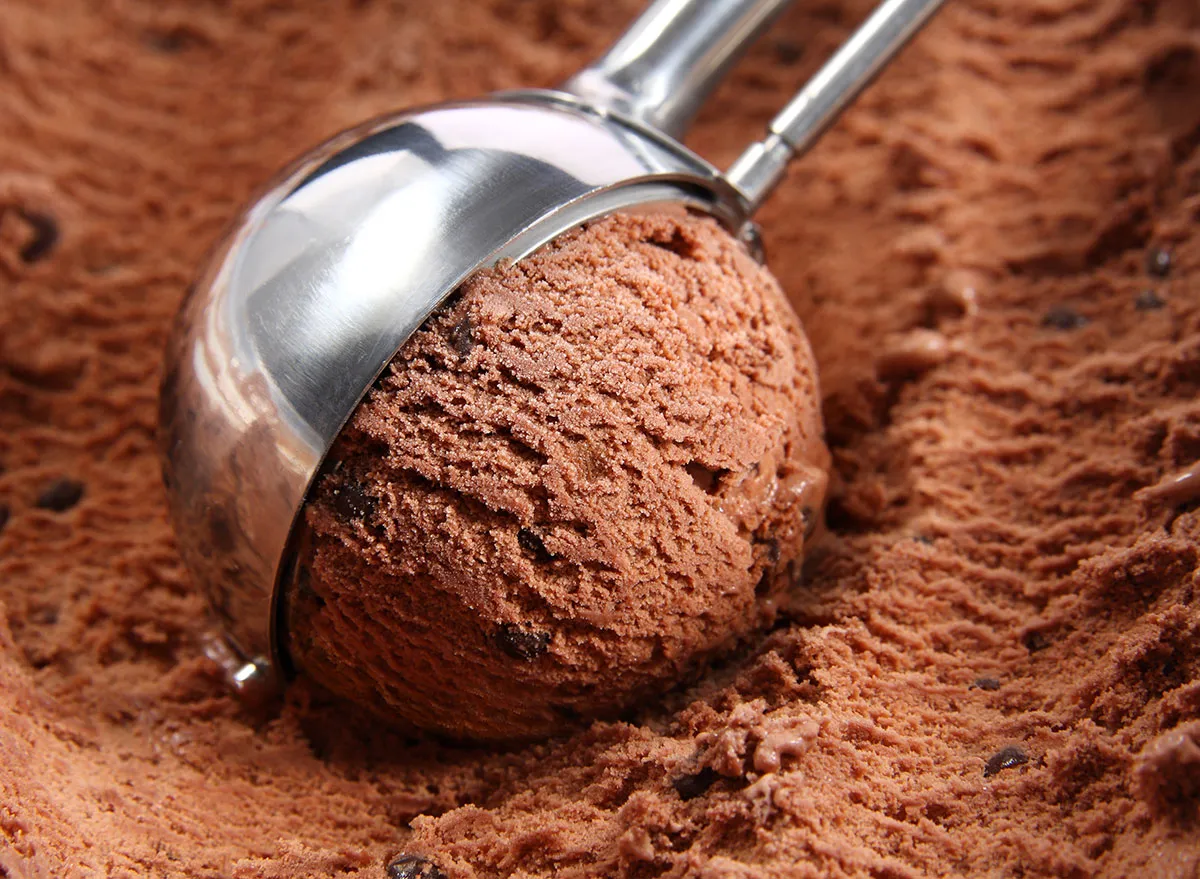
We hate to be the bearers of bad news, but saturated fat + added sugars = inflammation's match made in paradises. "According to the Dietary Inflammatory Index, saturated fat is one of the most inflammation-inducing nutrients, and a study of more than 100 arthritis patients who eliminated dairy reported self-perceived benefits," says Moon. "Keep in mind that they also eliminated a slew of other foods and added dietary and probiotic supplements to their diet, so it's hard to know how much of an impact removing dairy had. Plus, a study conducted on rats suggests that casein, the main protein in dairy foods, can reduce arthritis-related swelling, possibly by suppressing inflammation." As your own experiment, try cutting dairy from your diet and see what happens to your body when you give it up.
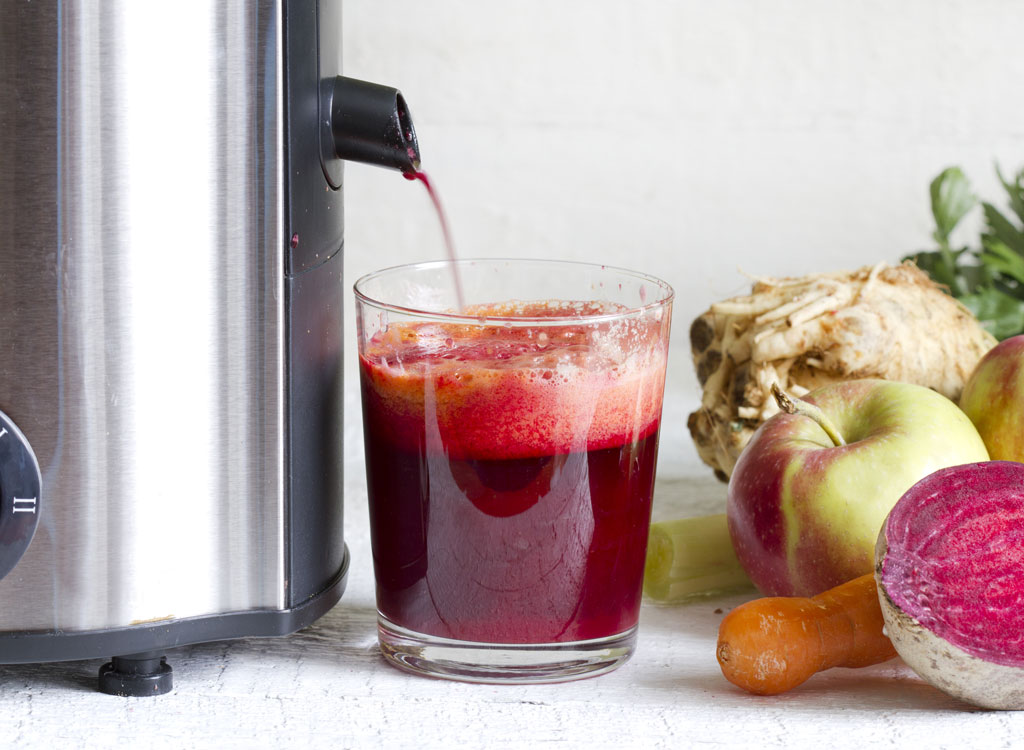
"One of the key drivers for inflammation [is] fruit juice that's high in sugar. This is especially important with the current epidemic of fibromyalgia and chronic pain, both of which are dramatically amplified by a process called microglial activation and central sensitization," explains Dr. Jacob Teitelbaum, MD, author of Pain Free 1-2-3. Teitelbaum continues, "Research shows that sugar especially drives this. All of these markedly amplify arthritis pain."
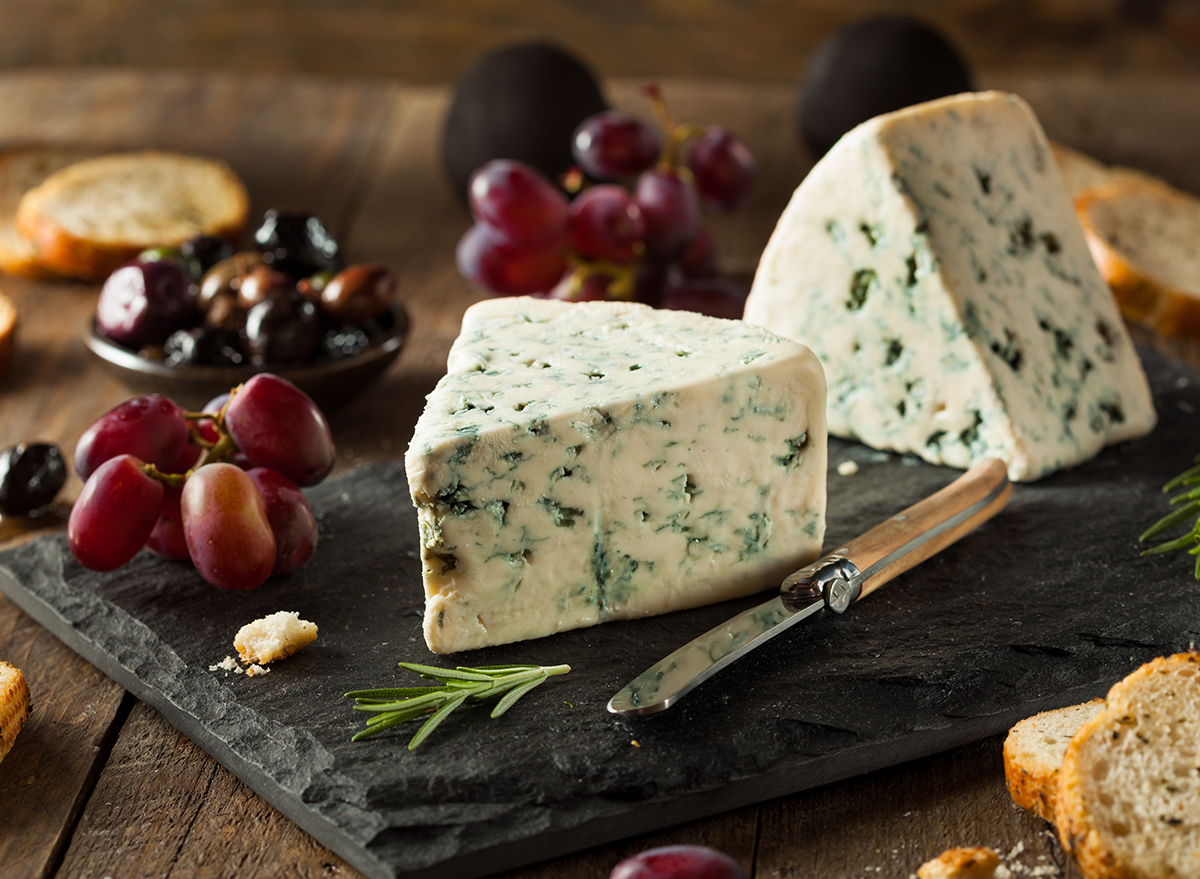
Before you melt some on your mac or sizzle up your next grilled cheese, know this: "Most cheeses contain a high amount of saturated fats, and saturated fats have been shown to be an inflammation trigger not only for heart disease but arthritis as well," says Gans.
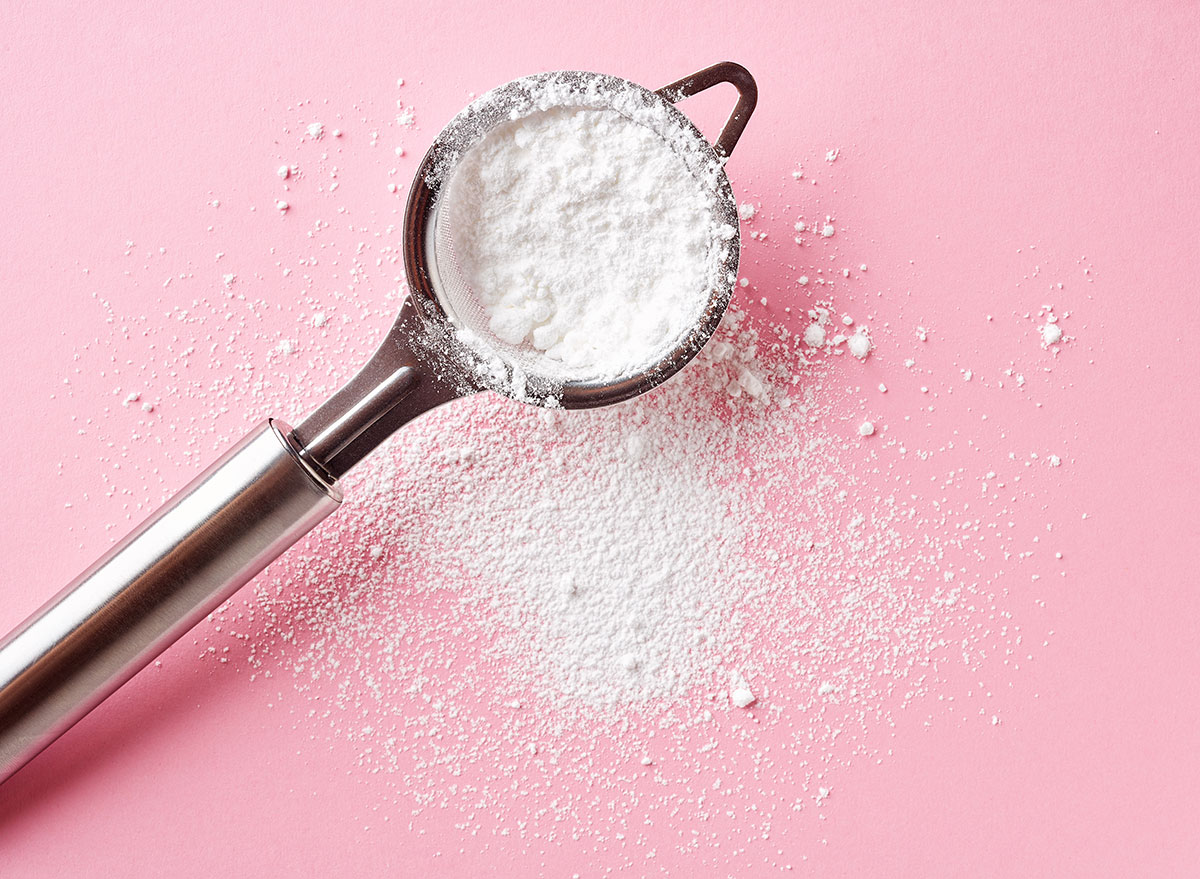
"High amounts of added sugar in your diet can also exacerbate inflammation. Additionally, if your diet is high in sugar, it may be lower in anti-inflammatory foods like vegetables and fruit," cautions Amer. "Limit added sugar by reading ingredient labels, and look out for sneaky sources of hidden added sugars."
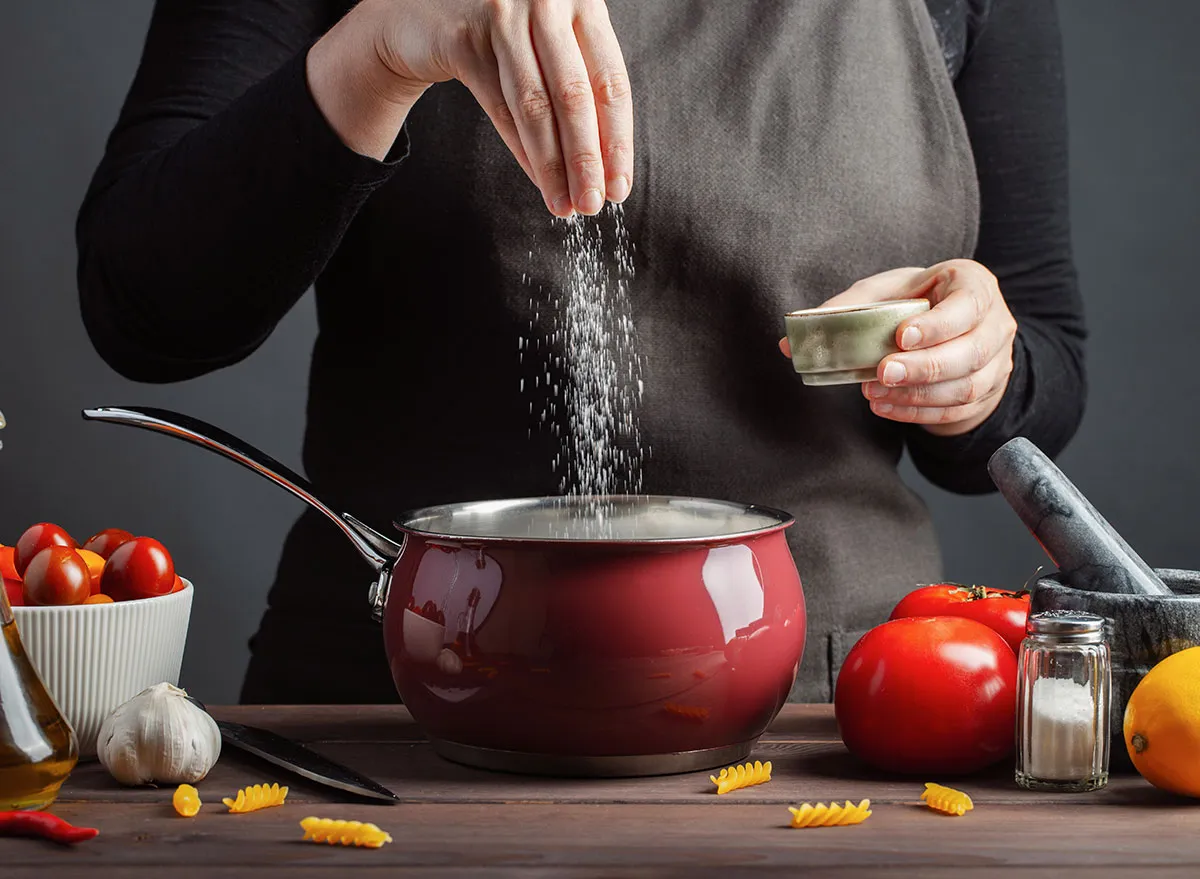
Excess sodium in your diet can wreak havoc on your body in many ways, from increased blood pressure to thyroid malfunctioning. It also may play a role in arthritis: "Salt may result in inflammation of joints," says Lisa DeFazio, MS, RD. "Avoid preservatives and additives. Less salt may help manage arthritis, so avoid prepared meals and limit your sodium intake to 2,300 milligrams per day," DeFazio suggests.
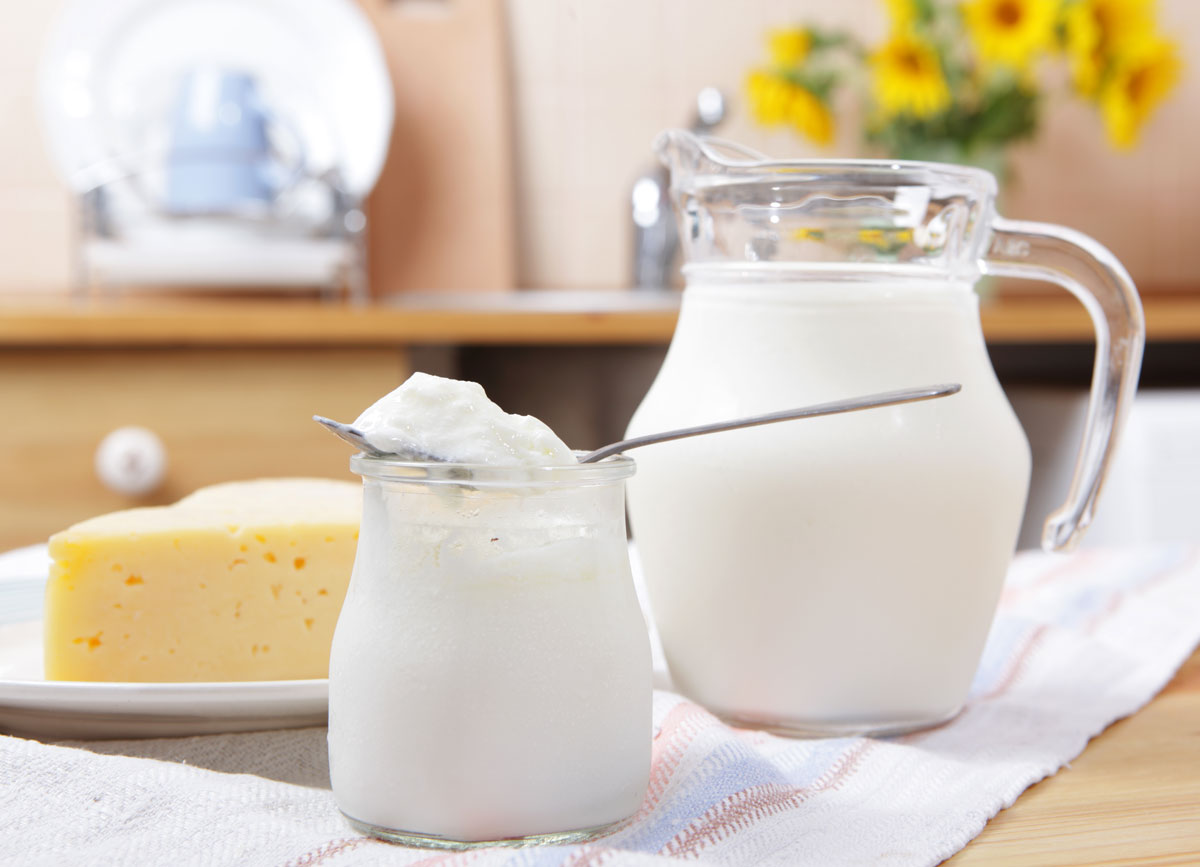
"Yes, we recommend drinking it for children and some people do well with it, but overall many individuals (about 60 percent of the population) have a hard time digesting milk and the proteins found in it, which can cause inflammation in the body," explains Shapiro. "Not all dairy causes inflammation, so if you want to enjoy it, try those that have probiotics to fight inflammation, including kefir and Greek yogurts (unsweetened of course!)."

"Fried foods can be inflammatory and potentially worsen arthritis because they're made with oils high in omega-6 fatty acids, like corn oil," says Amer. "While this is OK in moderation, in excess it can disrupt the balance of omega-6 to omega-3 fatty acids in your body, which can increase inflammation and therefore worsen arthritis."
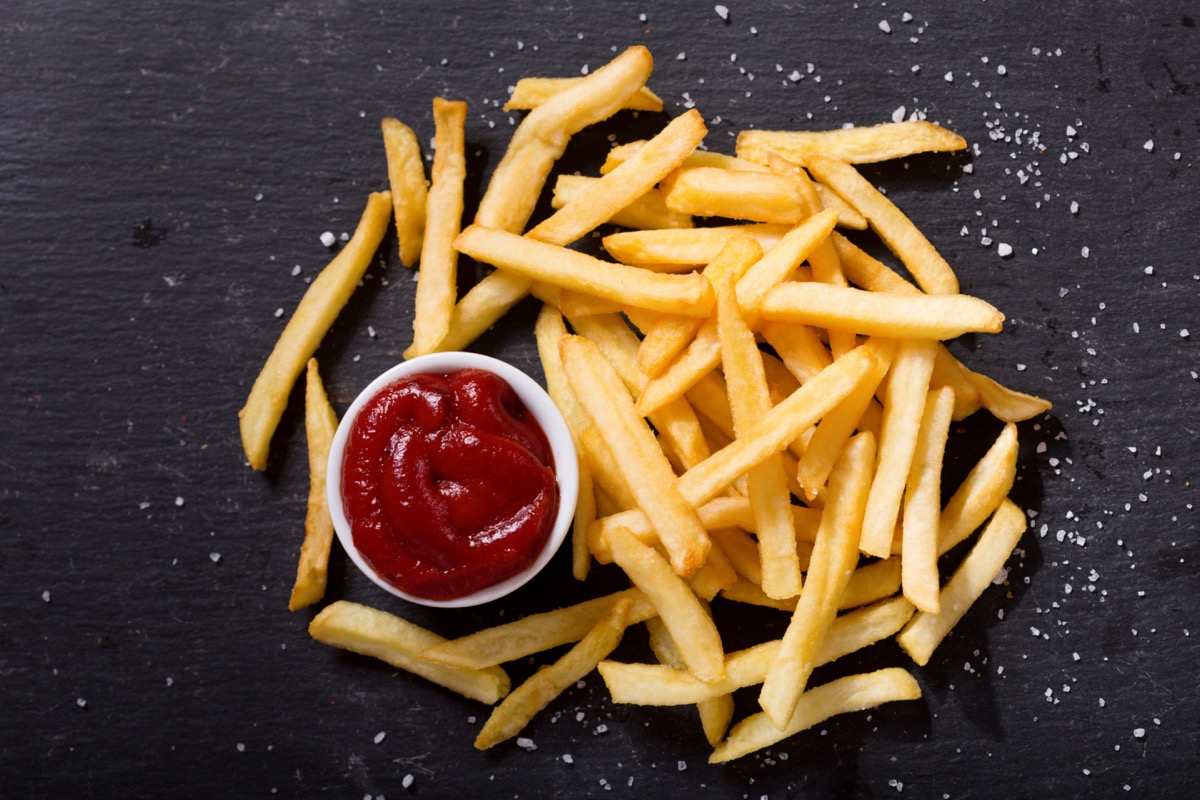
Yes, French fries should also be avoided, sorry ladies and gents. Can't control your craving? Try this best-ever oven-baked French fries recipe, or consider baking vegetables like carrots or parsnips up to a perfect crisp and enjoy them as a snack or as a side for dinner.
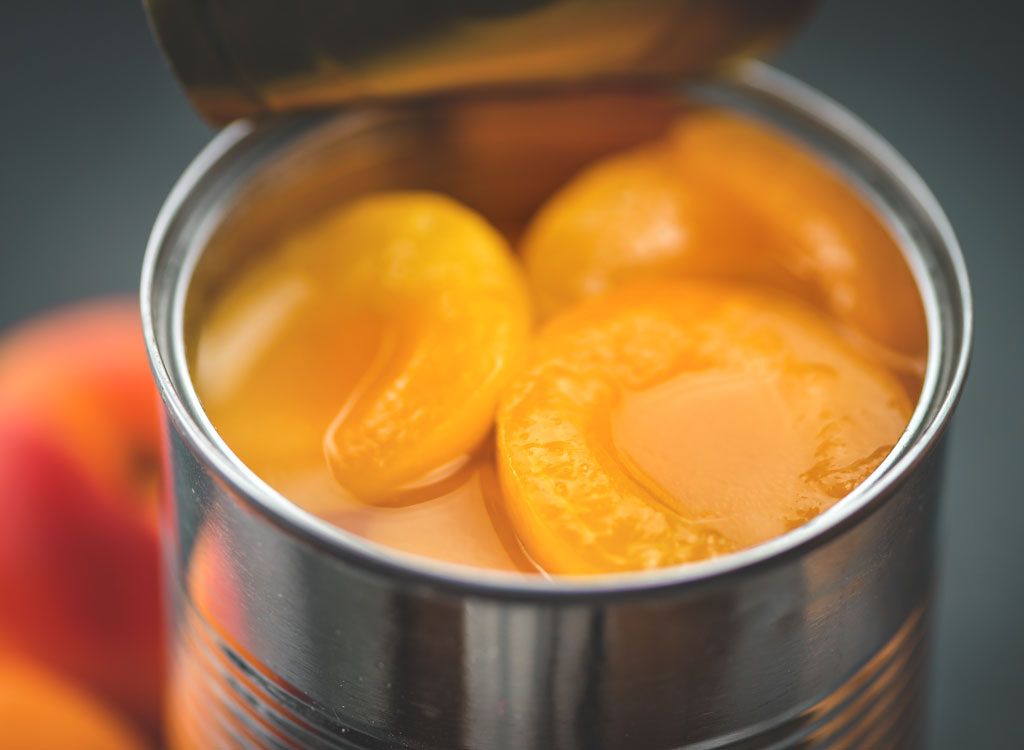
Note: We're talking about fruit packaged in heavy syrup. Dried and canned fruit with no added sugar is A-OK. "The added sugar in syrup may trigger the release of proteins in the body called cytokines. These cytokines have been associated with an increase in inflammation," says Gans.

Just like high-sugar fruit juices, soda, and baked goods, you should avoid candy at all costs if you have arthritis. Simple sugars, like those found in candy, can spike your blood sugar, leading to inflammation, which can worsen your arthritis symptoms.
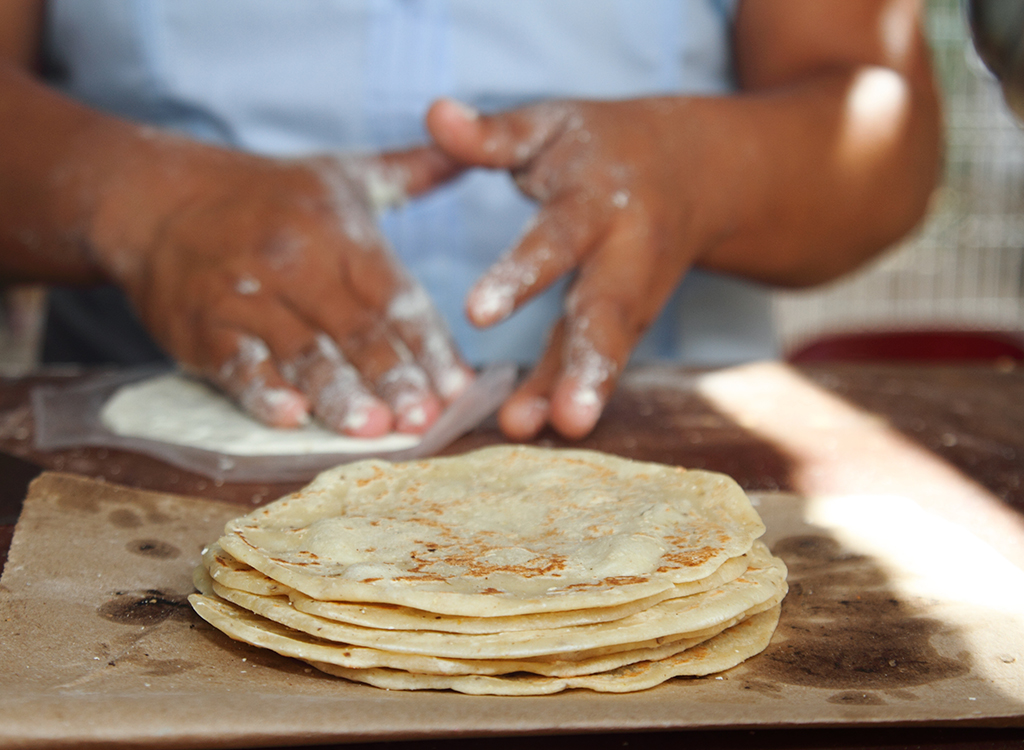
"White flour markedly drives inflammation," offers Teitelbaum. Plus, a study in The Journal of Nutrition found the same results. "White flour also accentuates the omega-3 deficiencies that powerfully impact joint inflammation by suppressing prostaglandin E3." Research has shown that omega-3s may prevent diseases like heart disease and diabetes, helping protect your brain in addition to fighting inflammation.

We love a slice (or three) of 'za, too, but it's no good for your body—especially if you're an arthritis sufferer. "Pizza is one of the largest sources of saturated fat in the American diet, thanks to the cheese," The Nutrition Twins comment. "Studies show that saturated fats trigger inflammation in the body's fat tissues, which not only worsens the symptoms of arthritis, but also leads to heart disease."
Does Cheese Make Arthritis Worse in Older Adults
Source: https://www.eatthis.com/worst-foods-arthritis/